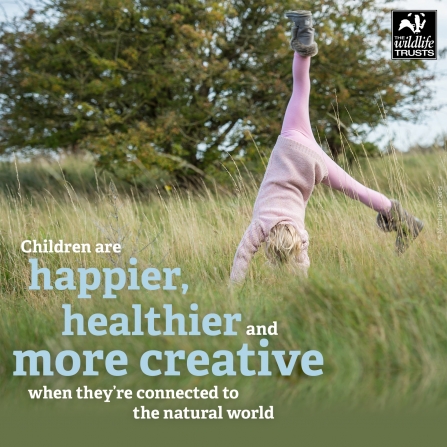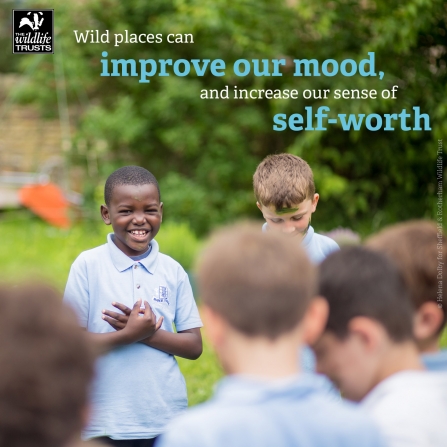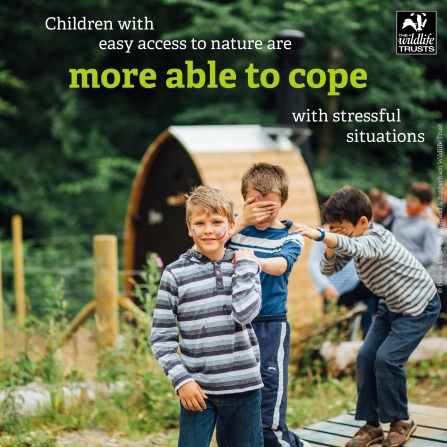As a child, I often remember saying to my mum “see you later mum”, and off I would go for the day armed with homemade jam butties and a bottle of pop. As long as I was back for tea it was OK, and I'd spend the day exploring outdoors with friends.
We would cycle around the fens, the roads weren’t as busy in those days, or head to the fields behind our house where there was a small copse of trees where we could climb or make a den, sit and listen to the birds in the reeds chattering away. Scores of rabbits and, if we were lucky the odd fox, were always about; we explored an old railway line where a fascinating old tunnel became our meeting place, sadly now only used by drug users. We'd catch butterflies in our nets or find ladybirds, putting them in jars with leaves and make breathing holes in the lid (possibly not the done thing these days but we always let them go after we brought them home to show mum and dad).
Autumn was a time for blackberries: hands, arms would be scratched to bits, T-shirt and face stained with blackberry juice. It was great being with dad picking blackberries as he could reach the best ones higher up. Sometimes, when my brother let me, I'd go out with him and his mates scrumping for apples although I was scared of getting caught. No matter what the weather - rain or shine, summer or winter - childhood days seemed endless fun exploring and playing outdoors. If not out with friends, then I was in the garden with dad following him everywhere with my little garden fork, probably more of a hindrance than a help. We'd dig and plan the vegetable garden outside together for hours, no doubt the reason why I love getting out in my garden now. Life was so much easier then for children to play outdoors; no computers, tablets, social media, mobile phones . . . roads were less busy and, although there would have been stranger danger then, it was something our parents or we didn't worry too much about.
Today, very sadly a generation of children are growing up disconnected from nature: just one in 10 ever playing in wild places. This is having a devastating effect on children, with the Primary Care Trust spending an estimated £713 million expenditure on child and adolescent mental health disorders in 2011/12. In addition, an estimated 28% of UK children are overweight or obese. Results from a poll conducted by The Wildlife Trusts:
- 91% of parents of children aged 18 (and under) think that having access to nature and wildlife is important for children, yet
- 78% of parents are concerned that children don’t spend enough time interacting with nature and wildlife
- 57% of parents said their children spend a little less or a lot less time outdoors than they did - many children are missing out on contact with the natural world
- Less than half (46%) of children aged 8-15 had looked for wild flowers with a parent/guardian or grandparent with even fewer (42%) listening for birdsong together
- 71% of children have never seen a lizard in the wild in the UK, more than half (53%) have never seen a flock of starlings and more than a third (37%) have never seen a hedgehog
However, there were some positive signs:
- 95% of children had visited a park with a parent or guardian, showing the importance of everyday places for experiencing wildlife. There are many positive effects of connecting children with nature, these include:
- Children with easy access to nature aremore able to cope with stressful situations
- Being outdoors in nature encourages exercise
- Wild places teach children about taking risks and making rational decisions
- Children are happier, healthier, creativeand more when connected to the natural world
- Wild places can improve our mood, and increase our sense of self-worth
- Playing and learning in places wild can help children meaningful to develop relationships family and friends
It doesn’t have to be difficult to connect children with the outdoors - in gardens, local parks or nature reserves, wrap up warm and head out. There are amazing, simple things to discover together: try a scavenger hunt to see how many different shaped leaves you can find, how many colours of green can you count, or stand very still and see how many different sounds you can hear. Make bird food to put outside, then count the birds that come to visit. Or come to one of the Trust’s events during the school holidays, a wonderful and engaging way to get children connected to the natural world, involving play, discovery and lots of fun, see events.
It made me realise all the things that I took for granted in my childhood: many children today never get that opportunity. That is why I have spent the last 20 years, working for organisations like the Wildlife Trust to help provide amazing opportunities for every child to experience and benefit the wonderment of our fantastic natural world.
Sir David Attenborough, President Emeritus of The Wildlife Trusts, said: “We will be physically, mentally and spiritually impoverished if our children are deprived of contact with the natural world. Contact with nature should not be the preserve of the privileged. It is critical to the personal development of children.”




